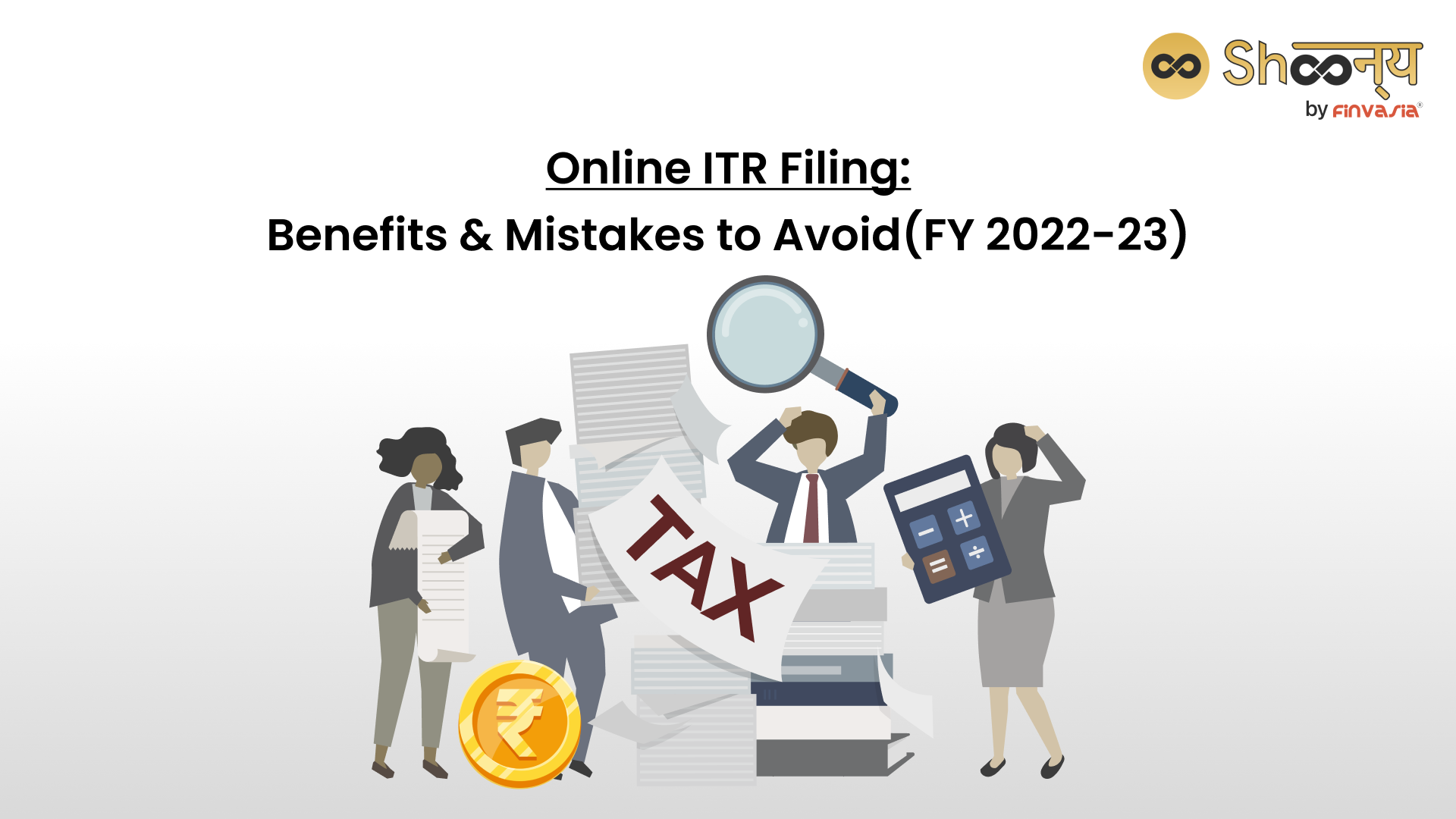Online ITR Filing: Benefits & Mistakes to Avoid (FY 2022-23)

As the deadline (July 31st, 2023) for filing income tax returns for FY 2022-23 approaches, it is crucial to know everything in advance to prevent common mistakes that can lead to penalties and unnecessary complications. Online ITR filing has become the norm, offering convenience and efficiency.
In this blog, we will uncover the benefits of filing ITR for salaried classes or self-employed individuals and shed light upon some common mistakes taxpayers make while filing their income tax returns.
Key Benefits of Filing ITR- Income Tax Returns.
Filing your income tax return (ITR) online brings several advantages beyond mere compliance. Online ITR filing offers the following essential benefits:
- Avoiding Penalties
One of the primary advantages of filing your ITR online is the protection against a penalty for late filing of ITR or legal issues imposed by the income tax department. For example, for an annual income up to ₹5 lakhs, the income tax department imposes a fine of ₹1000. However, if your income exceeds this threshold, the penalty can be as high as ₹5,000.
- Claiming Refunds
By filing your return, you can claim refunds if you have paid excess tax or if tax has been deducted at source (TDS). This process enables you to receive the rightful refund amount promptly, providing valuable financial relief, beneficial especially for the salaried class and self-employed individuals.
- Financial Documentation for Seamless Loan/Visa Processing
The ITR filing procedure serves as proof of your financial standing, which can be beneficial for various purposes, including loan approvals, visa applications, and other financial transactions. These receipts serve as supporting documents to validate your income statement as a borrower.
- Building a Financial History.
Consistent ITR filing demonstrates your financial responsibility and stability, which can positively impact future financial endeavours. Whether you plan to apply for loans, credit cards, or other financial products, a solid financial history can significantly enhance your credibility and increase your chances of approval.
Common Mistakes to Avoid in ITR Filing
- Selecting the Incorrect ITR Form
Choosing the right ITR form is vital for accurate filing. Different forms cater to various income sources and levels. For instance, if you are a salaried individual with a total income of up to Rs 50 lakh and income from other sources, ITR-1 is usually applicable. Selecting the wrong form can lead to notice for revised filing and possible penalties. Carefully evaluate your income sources and consult the income tax department’s guidelines to choose the correct ITR form.
- Reviewing Form 16 and Form 26AS.
Before filing your return, it is essential to cross-check the information in Form 16 (provided by your employer) and Form 26AS (available on the income tax department’s e-filing portal).
Form 26AS details the tax deducted at source- TDS and Tax collected at source- TCS. Ensure that the figures in Form 16, bank statements, and other financial records align with those in Form 26AS. If you find any errors, promptly contact the relevant tax deductor to rectify them.
- Reporting all Income, Including Interest Income.
Apart from your salary, you may have other sources of income, such as interest earned from bank deposits. Interest from savings accounts is also taxable and must be reported. Therefore, take care to disclose all income sources to ensure compliance with tax regulations.
- Declaring Income from Previous Employers.
If you changed jobs during the financial year, ensure that you report income from both your previous and current employers. Transparently reporting all income earned during the year will help you avoid unnecessary complications.
- Avoid Last-Minute Filing.
Waiting until the last day of ITR filing is never a good idea. Last-minute filing can result in missing important documents and crucial information. Additionally, heavy traffic on the e-filing portal near the deadline can lead to technical issues.
- Verification of ITR Filing.
Remember that filing your income tax returns online is incomplete until verified. Use the online verification options provided on the e-filing portal or send the ITR-V (acknowledgement form) to the designated address.
Failure to verify within 120 days can render your returns invalid, requiring you to file them as belated returns. In such cases, you are given a 30 days time period to verify your returns.
The last Date for ITR Filing for FY 2022-23 is July 31st, 2023.
Remember, if you are an active stock market trader, when filing your Income Tax Return (ITR) online, it’s important to have certain documents ready.
- Ensure you have a copy of your Permanent Account Number (PAN) card, as it is a unique identification number for tax purposes.
- Keep a copy of your Aadhaar card handy.
- Have a recent bank statement or passbook available, as it helps provide accurate financial information for your ITR.
- Ensure you have your login credentials for the income tax portal, as they are necessary for accessing and submitting your ITR online.
Penalty for Late Filing of ITR
Under the revised regulations outlined in section 234F of the Income Tax Act, failing to submit your Income Tax Return (ITR) by the due date can result in a penalty. The maximum penalty amount has been set at Rs.5,000.`
Sources:
______________________________________________________________________________________
Disclaimer: Investments in the securities market are subject to market risks; read all the related documents carefully before investing.








